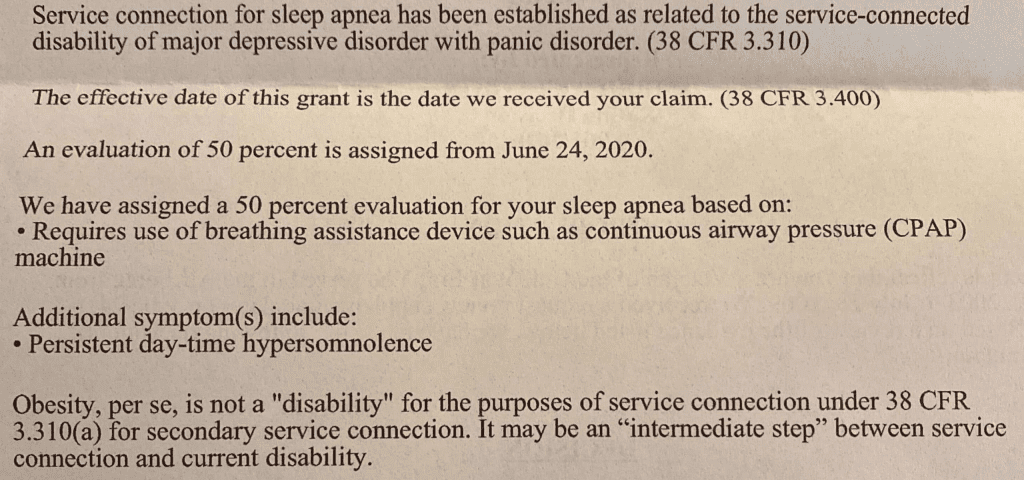Looking for Expert-Level VA Claim Answers?📱Call Us Now! 737-295-2226
Did you know you might be able to service connect VA sleep apnea secondary to weight gain as an “interim link?”
Yep, it’s true.
While weight gain and obesity is not eligible for a VA disability rating on its own, it can be used as an intermediate step for secondary service connection.
Let’s explore the connection between weight gain and sleep apnea along with the medical evidence needed to get a VA rating for sleep apnea as a secondary condition.
- Is There a Connection Between Weight Gain and Obstructive Sleep Apnea?
- Can I Service Connect VA Sleep Apnea Secondary to Weight Gain?
- Do I Need a Nexus Letter for Sleep Apnea Secondary to Weight Gain?
- Example of a Nexus Letter for Sleep Apnea Secondary to Weight Gain
- Need a Nexus Letter for Sleep Apnea Secondary to Weight Gain?
- Are You Ready to Win Your VA Claim? WE CAN HELP!
- About the Author
Is There a Connection Between Weight Gain and Obstructive Sleep Apnea?
Yes, there is a well-established connection between weight gain and obstructive sleep apnea (OSA) and supported by a substantial body of medical research (hundreds of studies over the years).
One study found obesity is considered a major risk factor for the development and progression of OSA; the prevalence of OSA in obese or severely obese patients is nearly 2x that of normal weight adults.
In addition, patients with mild OSA who gain 10% of their baseline weight are at a 6x increased risk of progression of OSA, and an equivalent weight loss can result in a more than 20% improvement in OSA severity.
Thus, weight gain, especially when it leads to obesity, is a significant risk factor for the development and exacerbation of OSA.
Here’s how weight gain is connected to OSA:
- Increased Fat Deposits: When people gain excess weight, especially in the neck and throat area, it can lead to the accumulation of fat deposits that can narrow the upper airway. This narrowing makes it more susceptible to collapsing or becoming obstructed during sleep, leading to episodes of apnea (cessation of breathing) and hypopnea (shallow breathing) characteristic of OSA.
- Mechanical Pressure: Excess body weight, particularly in the abdominal region, can exert mechanical pressure on the chest and diaphragm. This pressure can make it more difficult for the respiratory muscles to expand and contract effectively, leading to breathing difficulties during sleep and worsening OSA symptoms.
- Inflammation and Hormonal Changes: Obesity is associated with chronic low-grade inflammation and alterations in hormone levels, which can negatively affect the control of breathing and the function of upper airway muscles. These changes can increase the likelihood of OSA.
- Increased Risk with Obesity: The risk of developing OSA significantly increases with increasing body weight. Studies have shown that individuals with obesity are more likely to experience OSA, and the severity of OSA is often directly related to the degree of obesity.
It’s important to note that not every veteran who gains weight will develop OSA, and not every veteran with OSA is obese.
However, obesity is one of the most common and significant risk factors for OSA.
Can I Service Connect VA Sleep Apnea Secondary to Weight Gain?

Yes, you can get service connected for sleep apnea secondary to weight gain as an “intermediate” step for secondary service connection.
In Walsh v. Wilkie, the decision explained that when a service-connected condition “aggravates” a claimant’s weight gain / obesity, it may be used as an “intermediate step” between a condition that is service-connected and a new condition that can be compensated by the VA as a secondary service-connected condition.
For example, let’s say you’ve developed sleep apnea 10 years after leaving the military.
You now weigh 40 pounds more than you did on active duty.
It’s possible to file a VA claim for sleep apnea secondary to mental health with weight gain / obesity as an interim link.
Perhaps you take mental health medications that are well known to cause weight gain.
You need to get a Nexus Letter that explains how the mental health medications taken to manage your symptoms of mental health have caused weight gain.
Next, your Nexus Letter should link sleep apnea secondary to mental health with weight gain as the interim link.
It’s critical to explain that you would not have developed sleep apnea except for the fact that you’ve gained weight due to the side effects of medications taken to manage your mental health symptoms.
Thus, medication side effects that have caused weight gain CAN BE USED to establish secondary service connection as an “intermediate step.”
Do I Need a Nexus Letter for Sleep Apnea Secondary to Weight Gain?
Yes, you’ll need to get a Nexus Letter to service connect sleep apnea secondary to weight gain.
Why?
Because you need medical nexus evidence to link the “aggravated” weight gain as the causal factor between the current service-connected primary disability (e.g., PTSD) and the non-service-connected secondary condition (e.g., obstructive sleep apnea).
According to the VA’s M21-1, obesity may be an intermediate link between a service connected disability and a current disability that may be service connected on a secondary basis under 38 CFR 3.310(a) or on the basis of aggravation under 38 CFR 3.310(b).
To determine whether obesity is an intermediate step between a service-connected disability and the development of a current disability that may be service connected on a secondary basis, including by aggravation, the following criteria must all be satisfied:
- The service-connected disability must have caused the veteran to become obese (e.g., mental health medications taken to manage service-connected PTSD)
- The obesity as a result of the service-connected disability must have been a substantial factor in causing the claimed disability, or aggravating the claimed disability (e.g., the weight gain led to the development of obstructive sleep apnea), and
- The claimed disability would not have occurred but for the obesity caused or aggravated by the service-connected disability (e.g., the veteran would not have developed obstructive sleep apnea without the weight gain)
Obesity as an intermediate step for secondary service connection is only reasonably raised when there is evidence in the record that draws an association or suggests a relationship between the veteran’s obesity, or weight gain resulting in obesity, and a service-connected disability.
Incidental references to a veteran’s weight or weight gain are not sufficient to reasonably raise the issue.
Example of a Nexus Letter for Sleep Apnea Secondary to Weight Gain
[Date] [Your Name] [Your Address] [City, State, Zip Code] [VA Regional Office Address] [City, State, Zip Code]Re: Nexus Letter for [Veteran’s Name] VA File Number: [VA File Number] Secondary Condition: Sleep Apnea Service-Connected Condition: [Specify the service-connected condition]
To Whom It May Concern,
I am writing this Nexus Letter in my capacity as a licensed medical professional, duly qualified and experienced in the field of sleep medicine. I have carefully reviewed the medical records and history of Mr./Ms. [Veteran’s Name], a veteran of the [Branch of Service] with VA File Number [VA File Number].
I have examined Mr./Ms. [Veteran’s Name]’s medical history, including documented evidence of their service-connected condition, which is [Specify the service-connected condition]. Additionally, I have reviewed their relevant medical records, including diagnostic reports, sleep studies, and clinical notes.
It is my professional opinion that there exists a direct and substantial relationship between Mr./Ms. [Veteran’s Name]’s service-connected condition and the development and exacerbation of their sleep apnea. Specifically, I find that:
Weight Gain: Mr./Ms. [Veteran’s Name] has experienced a significant weight gain over the years, which is well-documented in their medical records. Weight gain, particularly in the form of increased adiposity in the neck and throat area, is a known risk factor for the development and aggravation of sleep apnea. This excess weight can lead to airway obstruction, causing episodes of apnea and hypopnea during sleep.
Aggravation of Sleep Apnea: There is clear evidence in Mr./Ms. [Veteran’s Name]’s medical records that their sleep apnea symptoms, including snoring, choking, and disrupted sleep patterns, have worsened concurrently with their weight gain. It is my professional opinion that the veteran would not have developed sleep apnea without the weight gain as an aggravating factor. These symptoms are consistent with the diagnosis of obstructive sleep apnea (OSA), which is commonly associated with excess body weight.
Medical Literature: Medical literature [LIST SPECIFIC STUDIES] supports the connection between weight gain and the development or exacerbation of sleep apnea. Hundreds of medical research studies have shown that obesity is a significant risk factor for OSA, and weight loss is often recommended as part of OSA management.
Based on the information available and my professional expertise, it is my considered opinion that Mr./Ms. [Veteran’s Name]’s sleep apnea is secondary to their service-connected condition and has been aggravated by their weight gain. The documented progression of their sleep apnea alongside their weight gain provides a clear nexus between the two conditions.
I trust that this Nexus Letter will aid in the evaluation of Mr./Ms. [Veteran’s Name]’s claim for secondary service connection for sleep apnea with weight gain as an interim link. Should you require any further information or clarification, please do not hesitate to contact me.
Sincerely,
[Your Name] [Your Title] [Your Medical License Number] [Your Contact Information]Need a Nexus Letter for Sleep Apnea Secondary to Weight Gain?
Trying to get a Nexus Letter to connect Sleep Apnea as a secondary condition with weight gain and obesity as an intermediate step?
WE CAN HELP!
Veterans who become members of the VA Claims Insider Elite program get access to a network of independent medical providers who can write a Nexus Letter for Sleep Apnea as a secondary VA claim at reduced rates.
Why pay $1,500 to $2,000 for a Nexus Letter when you can get one for $595?
Click HERE to speak with an expert now for FREE (no risk, no obligation, no high pressure sales tactics).
Are You Ready to Win Your VA Claim? WE CAN HELP!
- VA Claims Insider is the #1 most trusted name in VA disability claims.
- 25,000+ disabled veterans served in our membership programs since 2016.
- 30% average VA rating increase for veterans who complete our #1 rated Elite program.
- Employs 215 teammates; comprised of 74 veterans and 16 military spouses.
- 4.7/5.0 average rating out of 4,500+ total reviews; over 4,000 5-star reviews.
About the Author

Brian Reese
Brian Reese is a world-renowned VA disability benefits expert and the #1 bestselling author of VA Claim Secrets and You Deserve It. Motivated by his own frustration with the VA claim process, Brian founded VA Claims Insider to help disabled veterans secure their VA disability compensation faster, regardless of their past struggles with the VA. Since 2013, he has positively impacted the lives of over 10 million military, veterans, and their families.
A former active-duty Air Force officer, Brian has extensive experience leading diverse teams in challenging international environments, including a combat tour in Afghanistan in 2011 supporting Operation ENDURING FREEDOM.
Brian is a Distinguished Graduate of Management from the United States Air Force Academy and earned his MBA from Oklahoma State University’s Spears School of Business, where he was a National Honor Scholar, ranking in the top 1% of his class.


